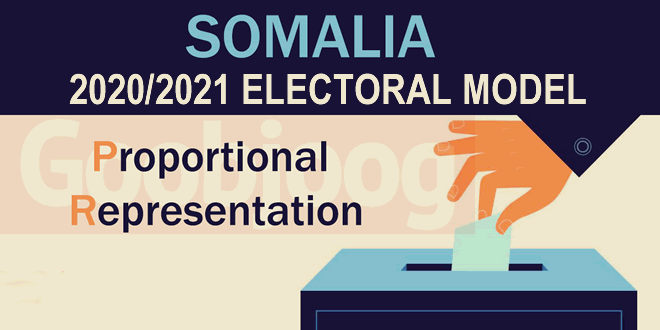by Aden Hire
Friday, June 7, 2019

Recently Somalia’s Lower House passed an election law which introduced proportional representation (PR) voting system for 2020/21 elections for parliamentarians and President to replace the medieval 4.5 system which was a disgrace to many Somalis even though it was understandable.
So, what is proportional representation and how does it work? Is it better than 4.5 system? Proportional representation is an electoral system that allows voters to be represented in a parliament in proportion to how they casted their votes. For example, if party A, B and C get 35%, 38% and 27% of the total votes in an election respectively, this means the 275 seats in the Lower House would be distributed as 96, 105 and 74 respectively.
Over 95 countries in the world use some form of proportional representation. It is by far the most widely used voting system in today’s democracies. South Africa, Algeria, Rwanda, Belgium, Italy, Switzerland, Denmark are among the countries with PR.
Proportional representation does not create false majorities but rather produces fair representation in a parliament compared to single member plurality (SMP), which Somalia used to use in the 1960s. PR is absolutely better and more civilized way of representing voters in a government than 4.5 power sharing depending other factors which I will mention later. The Economist’s ranking of fifteen top ranked democracies in the world, thirteen of them use PR. Some argue PR may have its limitations depending on how strong democratic institutions are, the political and social culture of a country, rule of law, strong civil servants, and level of civil liberty.
Vernon Bogdanor who has studied PR extensively said: To meet the canons of democracy an electoral system shall perform two functions. It should ensure first that the majority rules and secondly, that significant minorities are represented and heard. Single member plurality which is used in many democratic countries fails on both counts.
The pros of PR include it increases the likelihood of women and minorities being elected (inclusion), fair representation and consensual politics. It encourages parties to be left-centre or centre-right which gives less political space for extremist politicians to govern. Sometimes extremists get chance to win seats or lead as long as they pass the threshold required in the vote. PR requires from politicians to collaborate and compromise. Parties with centre policies tend to do well with clear platform and a leader who can build alliances.
A discussion for each PR system is far beyond the scope of this article but would briefly explain them. PR comprises three distinct families of electoral systems; Party list (closed party or open party list) which is party and candidate oriented respectively, single transferable vote (STV), a candidate oriented with a quota and mixed member proportional representation (MMP) which is both party and candidate oriented. Out of the three, party list is the most common system. Voting mechanism and election processes for PR is more complicated than single member plurality vote. For Somalia’s case it requires massive campaign to educate voters, political parties and candidates about PR.
Closed party list which is the one Somalia chose is party oriented with less emphasis on candidates. Voters have no preferences on candidates but can only vote for a party. Party leaders choose the list of candidates for member of parliamentarians. Party leaders may be able to manipulate the list based on their biases. If a party wins 20% of the total votes, the first 55 (20%*275) candidates in the order submitted by the party will become members of parliament. If a candidate is at the bottom of a closed list, the chances of getting elected as an MP is almost impossible. In a closed party list, party leaders will replace clan elders.
With the current election law passed by the Lower House, there is 7% threshold for parties to attain seats in the vote which means voters who vote parties with less than 7% of the vote, their votes will not be counted at all. This demands from voters to strategically choose a party so their votes are counted and represented. Another important note, The National Electorate Commission will tally votes and allocate seats by using Sainte Lague method which usually favours smaller parties. For example, if party A, B and C get 3.71, 1.64 and 1.62 seats respectively for a 7-seat election, the final seat allocation is 3, 2 and 2 for party A, B and C respectively.
The question of how voters will be screened, registered and selected for the vote will be a fundamental issue. Shall all registered voters vote or some would be selected to do so only? Can the National Electorate Commission show its independence from The Executive Branch? Would the National Electorate Commission create a level playing field and select exact number of voting centres and voters in the regions which can hold elections? Which company or entity would print voting papers? Who will safeguard voting papers? Lastly, would the result of elections and process be seen credible, fair and transparent?
Despite all of the challenges Somalia faces, the success of 2020/2021 elections with PR system for the first time in its history will rely on how The National Electorate Commission and parties plan and run the elections with the support of the international community, Federal Government of Somalia and Regional States.
Aden Hire
Aden can be reached at [email protected]
Aden is a Senior Political Analyst and is writing this article in his personal capacity.